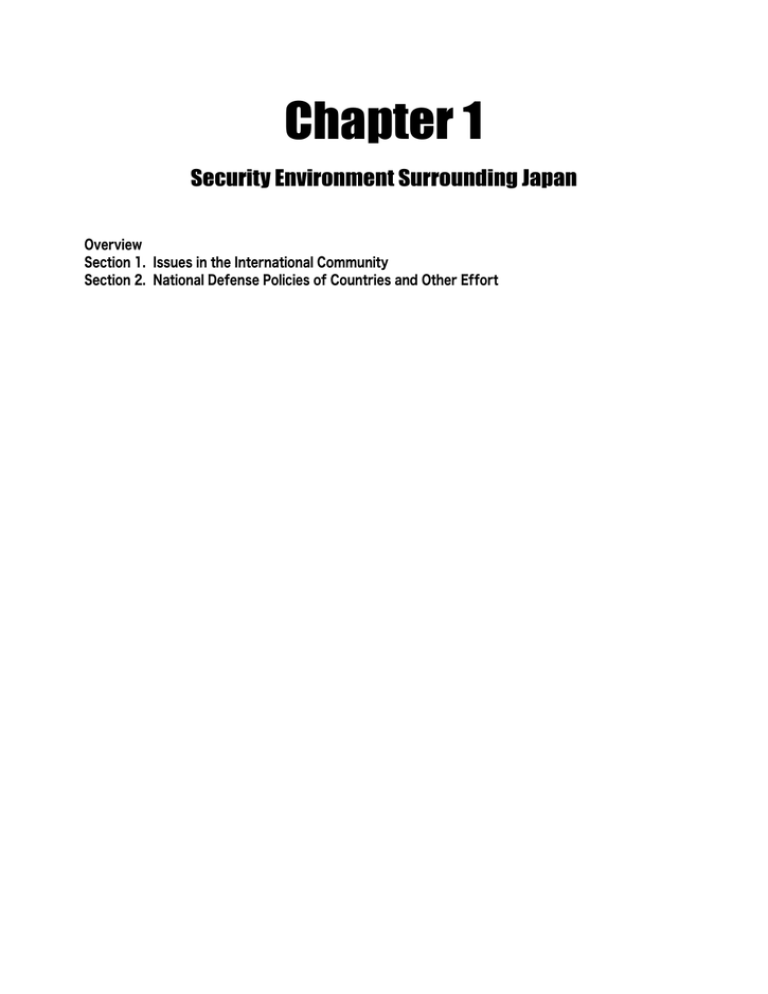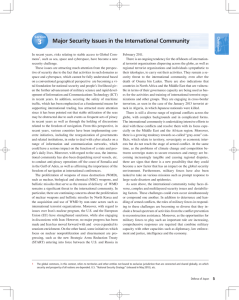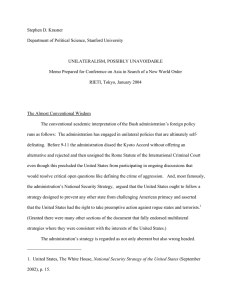Chapter 1 Security Environment Surrounding Japan
advertisement

Chapter 1 Security Environment Surrounding Japan Overview Section 1. Issues in the International Community Section 2. National Defense Policies of Countries and Other Effort Overview 1. General The most striking characteristic of the international security environment at present is the diversity and complexity of threats and the increasing difficulty of predicting when and where these threats will emerge. Activities of international terrorist organizations and other non-state actors in particular pose a serious threat to countries. Terrorism has traditionally been regarded as a criminal act, thus a matter of internal security. Terrorist organizations today, however, are skillfully exploiting greater social globalization generated by innovations in information technology, communications and transportation to transcend national borders in launching indiscriminate attacks against people and property by any means available. The terrorist attacks that took place in the U.S. on September 11, 2001 ("the 9/11 attacks"), spurred a substantial change in the conventional idea of national security, as they were large-scale and conducted in an unprecedented fashion. Although the 9/11 attacks led the U.S. and other countries to strengthen international cooperation to prevent and eradicate terrorism, terrorist attacks around the world have continued to this day. Last year alone, terrorist attacks in London, Bali (Indonesia), Egypt and other places claimed numerous lives, while Afghanistan and Iraq, both working on reconstruction, continue to face terrorist attacks targeting civilians, law enforcement officers, and multinational military forces on a daily basis. Ranking alongside terrorism as a notable threat to security is the proliferation of the weapons of mass destruction (WMDs) such as nuclear, biological and chemical weapons and ballistic missiles that serve as a means of delivery for these weapons. Under the Treaty on the Non-Proliferation of Nuclear Weapons (NPT), only five of the 189 contracting parties - the U.S. Russia, the U.K., France and China - are authorized to possess nuclear weapons, but several other countries have declared their de facto possession of nuclear weapons or are suspected of possessing or developing nuclear weapons. The proliferation of WMDs has sparked serious concern about the possible acquisition of such weapons by international terrorist organizations. Consequently, halting WMD proliferation has become an urgent issue for the international community. Regional conflicts stemming from religious and ethnic issues are also major problems for the international community. The Middle East continues to suffer a chain reaction of violence between Israelis and Palestinians, with no prospects for a fundamental resolution. In Africa, most of the regional armed conflicts remain unsettled and the region still encompasses many politically unstable countries. Under these circumstances, with growing interdependency among states, building a more stable international security environment has become a common interest of all states. Cooperation in countering regional conflicts and new threats such as international terrorism has taken on even greater importance for the international community. The U.S., who has taken the lead in "fight against terrorism" since the 9/11 attacks as the world's sole superpower, admits that cooperative relations with allies and partner countries in coping with terrorism and other complex challenges are essential even for the U.S., because these challenges can no longer be addressed by the U.S. alone.1 As the U.S. adopts a posture of placing higher priority on close working relations with allies and partner countries, it is also seeking to establish cooperative ties in areas of common interest with China, Russia and other countries. On the other hand, a more active approach that goes beyond the conventional idea of deterrence is needed to forestall the emergence of threats from terrorist organizations and other actors whose actions are not necessarily based on rational judgment. Considering several cases that terrorist organizations have infiltrated into states devastated by civil war or other disruptions to transform those countries into hotbeds of terrorism, it is imperative that the international community provides assistance to restore and stabilize such states. Taking these into account, many countries are currently engaged in active endeavors, including the ―2― Chapter 1 Security Environment Surrounding Japan dispatch of military units, to ensure the reconstruction and stabilization of Afghanistan and Iraq. In Afghanistan, a parliamentary election was conducted in September 2005 as the completion of the political process. In Iraq, a national parliamentary election was conducted in December 2005, and a new cabinet led by Prime Minister Maliki was established in May this year. International cooperation in the event of large-scale natural disasters is also increasingly critical for the sake of international peace and stability. After the earthquake off the coast of Sumatra and the resulting tsunami in the Indian Ocean in December 2004, the earthquake in Pakistan in October 2005, and the central Java earthquake in Indonesia in May this year, countries including those within the region carried out operations for the relief of the victims and the reconstruction by promptly dispatching 2 military units and other means. Today, security of each country is closely related to global security, as well as respective regional security, therefore cooperation among states is becoming even more important for the stability of the international community. 2. Security Environment in the Asia-Pacific Region The Asia-Pacific region, in which some countries such as China and India are enjoying rapid economic development, is drawing heightened worldwide attention and has seen enhanced coordination and cooperation among countries, mainly in the area of economy. At the same time, however, long-standing issues such as territorial disputes and the reunification of divided nations plague the region. The Asia-Pacific region has not undergone such significant changes in the security environment as had been seen in Europe after the end of the Cold War. The possibility of a large-scale armed conflict between states that existed during the Cold War era has been eliminated in Europe, and terrorism and conflicts in neighboring regions are now being regarded by each country as common security threats. In the Asia-Pacific region, on the other hand, the pattern of disputes among countries and areas remain intact even in the post-Cold War era, and views on security and threat perceptions vary greatly by country. On the Korean peninsula, Korean people has been divided for more than half a century, and the face-off between the military forces of North Korea and South Korea continues. The region is also troubled by such challenges as the issue concerning Taiwan and the overlapping territorial claims on the Spratly Islands. Japan also confronts unresolved territorial disputes over the Northern Territories and Takeshima both of which are an integral part of Japanese territory. In April this year, when the Japan Coast Guard was about to conduct hydrographic survey in an area where both Japan and South Korea claim exclusive economic zone, South Korea reacted strongly to the survey3. When a South Korean oceanographic research vessel started survey in the area in July this year, Japan demanded an immediate halt of the activity. Many countries in the Asia-Pacific region, against the background of economic growth, have been expanding and modernizing their military capabilities by increasing defense budgets and acquiring new equipments. Moves in this regard by China, a major power with significant economic and political influence in the region, are drawing particular attention from other countries. The North Korean nuclear issue has also heightened international concern since 2002 due to its serious impact not only on the security of East Asia but also on the international community as a whole from the viewpoint of the prevention of the WMD proliferation. In the Six-Party Talks held in September 2005, North Korea promised to abandon all of its nuclear weapons and existing nuclear programs, but no concrete progress has been seen since. North Korea is required to take measures to implement the agreements reached in the Six-Party Talks promptly and steadily. The issue of abduction of Japanese nationals by North Korea is another very grave problem posing a considerable threat to the lives and safety of Japanese ―3― Fig. 1-0-1 citizens. As the whereabouts of many kidnapped victims have yet to be confirmed, a sincere response should be made by North Korea. In recent years, terrorism and piracy in Southeast Asia have seriously affected the region's security. Terrorist organizations and separatist/independence groups have reportedly conducted terrorist attacks in Indonesia and the Philippines. The Malacca Straits and the Singapore Straits, important international sea lanes of communication, are suffering from frequent piracy incidents. Given this security environment in the Asia-Pacific region, Japan and other countries have established ―4― Chapter 1 Security Environment Surrounding Japan bilateral alliances and friendly relations with the U.S. and accordingly allow the stationing or presence of U.S. forces in their territories. The security environment in Europe has changed considerably since the end of the Cold War: European countries are pursuing multi-layered approach such as the NATO enlargement and the effort by the EU and other frameworks. Substantial reductions in U.S. forces posted in Europe are also on the table. On the contrary, uncertainty and unpredictability still remain in the Asia-Pacific region, and the U.S. military presence continues to play a key role for the regional peace and stability. Nevertheless, recent years have seen an increase in opportunities for bilateral defense exchanges between countries in the region. Likely, the efforts to promote multilateral security dialogues are now well rooted, including the ASEAN Regional Forum (ARF) and a conference4 hosted by a non-governmental institution with the participation of relevant defense ministers5. Furthering such confidence building measures among countries, alongside the stable U.S. military presence, is also important to ensure security in the region. [COLUMN] Launch of Ballistic Missiles by North Korea COMMENTARY The Defense Agency/Self-Defense Forces concluded, after comprehensively examining various information, that North Korea launched towards the Sea of Japan six ballistic missiles in the early morning and another one in the evening of July 5, 2006. The launch of ballistic missiles by North Korea is a matter of grave concern for Japan, and we think that the fact that North Korea pressed the missile launches despite advance warnings by countries concerned including Japan is a serious problem from the viewpoints of the security of Japan, the peace and stability of the international community, and furthermore the nonproliferation of weapons of mass destruction, as well as a problem from the view point of international laws concerning navigational safety of ships and aircrafts. The Defense Agency estimates that, out of seven ballistic missiles launched, the third one launched at around 5 am was from Taepodong in the eastern coastal area and the others were from Kitaeryong in the southeastern coastal area of North Korea. The third one was judged as a Taepodong-2, and the others either Scud or Nodong. In light of this situation, the Government of Japan started taking actions as a whole including holding the Security Council. The Defense Agency also took the surest measures to collect information and respond to the situation by, for example, establishing the "Headquarters for the Issue of the Ballistic Missile Launch by North Korea" headed by Minister of State for Defense at 4 am. ―5―






